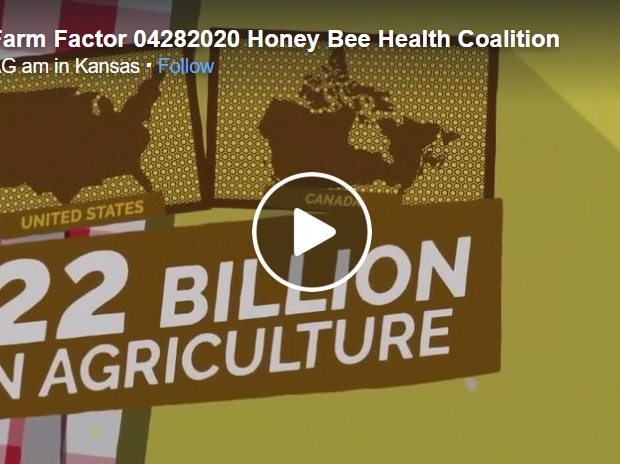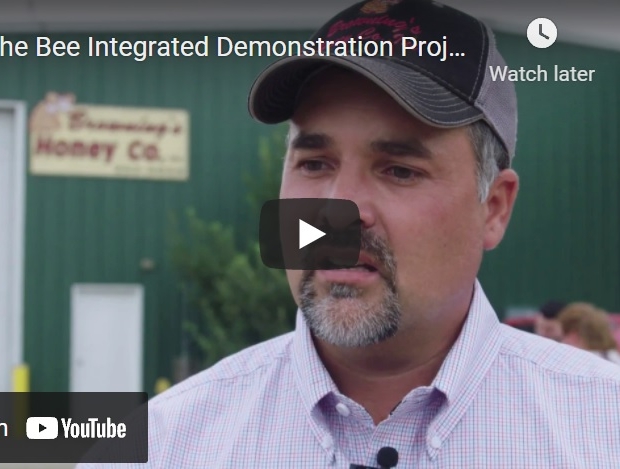News
Springing Into Action for Bees
With spring in high swing and fields abuzz with productive pollinators, the Honey Bee Health Coalition is continuing to work with its partners and members to support healthy bees across North America — and beyond. The Coalition recently hosted its annual spring meeting in California to discuss ongoing initiatives and its collaborative approach to confronting the challenges honey bees face.

Thanks to Coalition member and American Honey Producers Association Vice President Chris Hiatt for giving us a tour of his honey production facility and apiary during the meeting. It was an informative and sweet experience for the Coalition members and meeting attendees.
Cultivating Allies in Washington

The Coalition has worked since its founding to ensure public policy supports farmers, beekeepers, and others working at the field level to enhance pollinator protections. That’s why the Coalition partnered with the Monarch Collaborative to reach out to and meet with Under Secretary for Farm and Foreign Agricultural Service Bill Northey.
Northey, who served as Iowa’s Secretary of Agriculture before being confirmed to his position at the U.S. Department of Agriculture, hosted the Coalition and Monarch Collaborative this month.
The Coalition and Monarch Collaborative highlighted the importance of the department’s private lands programs in supporting pollinator habitat on farms across the country. The two groups also urged Northey to enhance pollinator habitat in USDA private land conservation programs by improving outreach and implementation associated with these programs as well as the quality and cost-effectiveness of program specifications and habitat plantings.

Monitoring Reminder
Varroa mites pose a serious threat to honey bee colonies across North America. That’s why the Coalition has developed a comprehensive guide and how-to videos to help beekeepers confront these pesky parasites.
But at the core of the Tools for Varroa Management Guide is the need for beekeepers to regularly check their colonies for Varroa mite infestation levels:
Generally, a beekeeper should perform Varroa monitoring assessments at least four times during the year and treat if Varroa exceeds the 2 percent to 3 percent threshold. Beekeepers, at a minimum, should monitor (and treat if necessary) in the spring before honey supers are on, again when supers come off in late summer, again in the fall, and finally once more prior to overwintering. If you treat your bees, it’s important to check them again following conclusion of the treatment to see if the treatment was effective and mite level is below the 2 percent to 3 percent threshold.
This approach ensures that beekeepers can not only treat Varroa mite infestations before they become catastrophic, but also tailor their treatments to the actual conditions within their colonies. Keeping mite numbers low is proactive best-management practice; seeking to bring high mite levels under control is more difficult.
Be sure to check out the Tools for Varroa Management Guide and continue to monitor your hives!
Hive Management Resources
The Coalition has worked with experienced beekeepers and experts to develop and vet resources to help beekeepers — professional and amateur alike — support bee health. These resources have been a huge hit with Coalition members and others around the world.
Building on this success, Bee Culture Magazine’s Kim & Jim Show showcased the Coalition’s hive management resources in a recent webinar. Be sure to check out this great episode and share it with your friends.
Pollinator Week 2018 Reminder
The Coalition works throughout the year to engage the public on the importance of honey bee health to our food and farms. Pollinator Week, however, is a critical time to highlight how healthy bees are essential to healthy people and a healthy planet. Help the Coalition get the word out about events and initiatives during Pollinator Week 2018 — June 18 to 24 — by replying to this newsletter to share information about upcoming events.

